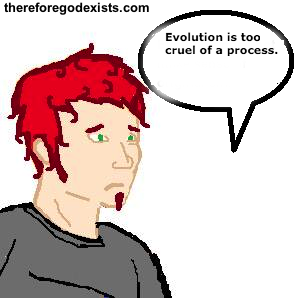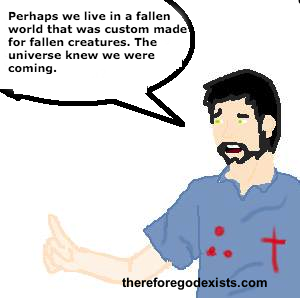 The intersection of science and faith has produced no small amount of controversy. It is at this intersection that people find it prudent to either depart from faith or depart from science, and both of these alternatives have devastating implications for the body of Christ. For if we depart from science, we assumed a stance of anti-intellectualism and rail against a methodology that has produced fruitful yieldings, such as medicine, industry and technology. Yet this is what we find in discussions about the age of the earth and evolution among Christians. Christians are not keen toward evolution. This may be because it uproots the old apologetic about how we can explain biological diversity. It may be because they were traditionally taught to deny evolution. However there are some traditions that are not based in scripture but are clung to as if they were. I would like to suggest that this is on of them. Could God have used evolution? He most certainly could have.
The intersection of science and faith has produced no small amount of controversy. It is at this intersection that people find it prudent to either depart from faith or depart from science, and both of these alternatives have devastating implications for the body of Christ. For if we depart from science, we assumed a stance of anti-intellectualism and rail against a methodology that has produced fruitful yieldings, such as medicine, industry and technology. Yet this is what we find in discussions about the age of the earth and evolution among Christians. Christians are not keen toward evolution. This may be because it uproots the old apologetic about how we can explain biological diversity. It may be because they were traditionally taught to deny evolution. However there are some traditions that are not based in scripture but are clung to as if they were. I would like to suggest that this is on of them. Could God have used evolution? He most certainly could have.
 God Can Do Anything That He Would Like
God Can Do Anything That He Would Like
I am afraid that Christians too often restrain God based on our expectations of him. We may suggest that he could never act in a certain way just because we cannot make sense of his actions. We may say that he could never allow some evil thing to occur because we cannot understand what the greater good would be. Similarly, we may suggest that God could not use evolution because it is not what we would expect of him. Well, is not God free to create as wishes? Are we really going to limit God and say that there is no possible world in which he created via the processes of evolution? Could God use evolution? Well just consider the creation of a new child and the stages of life that it goes through, from an embryo to an adult. If we believe that God guides this process and creates in this way, then why is it so difficult to believe that God could create all life in this way?
 Is evolution too cruel of a process?
Is evolution too cruel of a process?
Genesis 1 tells us that after God created the heavens and the earth, he looked over it and said that it was very good. However, the evolutionary model will have animals eating each other. Evolution is based on surviving in harsh conditions and adapting to those conditions. It struggles forward, being pushed on the cart of death with broken wheels. The world will be full of death. A young earth creationist would point out that their model has all death and suffering after sin. Death and suffering are a consequence of the sin of man. But, they object, on the evolutionary model, death and suffering and inherent to this world. Since God said that the world was good, and he would not create via a cruel process, we should recognize that evolution is an unacceptable model that makes God appear to be cruel.
 But when God said that the world was ‘very good,’ what did he mean? There was a functional ecosystem and the natural world teaming with life and the roots of humanity present. It was very good. But did God mean that it was perfect? The Bible does not use that word. Perhaps it was not his ideal world. After all, why would he separate Adam and Eve by putting them in the Garden of Eden, unless the world was a cruel place? Further, even if death does come before sin, did God not know that Adam and Eve were going to sin? Of course he did. As I pointed out in my article Did Animals Die Before The Fall? the universe knew we were coming. God created a fallen world for fallen creatures. It was full of death and suffering because he knew that we would sin. But until that time came, he set Adam and Eve aside in the Garden of Eden.
But when God said that the world was ‘very good,’ what did he mean? There was a functional ecosystem and the natural world teaming with life and the roots of humanity present. It was very good. But did God mean that it was perfect? The Bible does not use that word. Perhaps it was not his ideal world. After all, why would he separate Adam and Eve by putting them in the Garden of Eden, unless the world was a cruel place? Further, even if death does come before sin, did God not know that Adam and Eve were going to sin? Of course he did. As I pointed out in my article Did Animals Die Before The Fall? the universe knew we were coming. God created a fallen world for fallen creatures. It was full of death and suffering because he knew that we would sin. But until that time came, he set Adam and Eve aside in the Garden of Eden.
Is evolution too wasteful?
Natural selection occurs by a series of trial and error. It adapts to the environment slowly by a long and rigorous process. Creatures will die because of harsh conditions implanted in their genes, and their memory, and a slight adaptation results to make them more likely to survive. Different environments will yield different animals. But why would God choose to create in this manner? It is quite inefficient. As an omnipotent deity, God could create everything ex nihilo instantly in just a nanosecond. He does not even need six days. 144 hours is a long time as well for God. He could have done it immediately. Why would he take so long, then? Why take six days? Why spend billions of years developing these creatures? Is he not wasting time and resources?
Well, as Dr. William Lane Craig pointed out, one can only be wasteful if they have limited time or limited resources. But God suffers neither of these burdens. He is not in danger of running out of time or using all of his resources. He has unlimited time to do with the universe as he pleases. I am afraid that we tend to think of God as too much like an engineer, as though he were just trying to get the job done. Perhaps he is more like an artist who enjoys painting a canvas. Could God use evolution? If we stop thinking of God as an engineer who is chiefly concerned with efficiency, then there is no conflict with evolution.
Why is God covering his tracks?
I think that one of the most significant problems that people have with the Theory of Evolution is that it seems to lend to metaphysical naturalism. After all, if all of life could occur by natural processes, then God would seem to just be covering his tracks, hiding his divine intervention. Where is he? Why can we not see the hand of God in the universe? Why is he going to such lengths to hide himself by creating processes such as evolution? Well first, as I pointed out in my series Evidence For God, he did not hide himself. He provided evidence for his existence in the natural world, and supremely in the incarnation when the Son came to die for our sins and rise from the dead. So God did not cover his tracks.
Further, the mind boggles as I try to consider whether there is a significant difference between God covering his tracks by using evolution to create life, and God covering his tracks by allowing the universe to be governed by natural laws. When we see a miracle, it is something incredible because it is so rare. When the hand of God reaches down to intervene in the earth, it is amazing. But, it did not have to be like that. Everything could be a miracle. God could routinely perform miracles and routinely interact with us. One could ask, why does he cover his tracks? (I answered this question in my article Why Is God Invisible?) Well, any answer that you give will also be applicable to why God would cover his tracks when he created life. Could God have used evolution? He could have. He could have hidden his tracks just as he did by allowing our universe to be governed by natural laws.
What about Genesis 1-3?
Genesis 1-3 is the first account in the Bible of the creation of the world. Young earth creationists interpret this passage as describing literal 24 hour days over a period of one week, and they insist that this is the only interpretation that is not a retreat caused by modern science. However, Saint Augustine said, “What kind of days these were [in Genesis 1] is extremely difficult, or perhaps impossible for us to discern.” It seems that Augustine was quite receptive to the modern interpretation of Genesis, and even articulated some views that looked something like evolution. Serious students of theology do not need to hold to a literal or young earth interpretation of this chapter. As I pointed out in my article Where Does The Bible Say That The Earth Is 6000 Years Old? there are a number of plausible interpretations of the creation week and we are not restricted to a 144 hour reading of the text.
Second, what about Adam? If Adam was the first man, how is it that evolution could have occurred? Well, this makes two assumptions, first that Adam was a literal historical figure, and second that he was the first man. The Bible never says that Adam was the first man. It may be the Adam was brought forth in an act of special creation, from the dust of the ground after the homosapien kind that pre-existed on the earth, and then he would be the first homosapien to be endowed with the image of God. This would also resolve bizarre questions regarding Cain finding his wife. Where did he find her? Perhaps he went into the other villages.
However, one may object to this that it seems to compromise the doctrine of original sin. For if we are not all children of Adam, then from where did we receive our sinful nature? Well, as I pointed out in my article Do Adam And Eve Disprove Original Sin? this objection would not reflect a robust understand of what original sin is. For we are all under the Federal Headship of Adam. When Adam fell, God judged the entire human race with him. As 1st Corinthians 15:22 says, “For as in Adam all die, so also in Christ all will be made alive.” To that, we might object that it is not really fair for God to judge us for Adam’s sin. But God knew that Adam could properly represent the entire human race, and there is no human being who would have been more righteous than he was. Could God have used evolution? There does not seem to be any good objection stemming from the creation week, the historical man, Adam, nor the doctrine of original sin.
Why did Jesus say, ‘In the beginning, God made them male and female…” (Matthew 19:4)
Genesis actually quoted Genesis 1, joining the first verse “in the beginning” with the text concerning the creation of man. The young earth creationists will usually argue that since Jesus seemed to take this text literally and offered a practical application, then we should as well. First, a theistic evolutionist is free to take this text literally depending on which interpretive model of Genesis 1 they adopt. Second, we all believe that in the beginning, God made them male and female. Could God have used evolution? He could have, and he would have created male and female “in the beginning.”
The only thing that the young earth creationist would be reduced to saying that is that since Jesus connected “in the beginning” with this text, that this demonstrates that mankind must have been created quite soon after the initial creation in Genesis 1:1, which would create problems for the evolutionary paradigm. Well, that’s quite a relative argument. One person could think that the “beginning” was the first day or the first millisecond. The next person could think that the beginning was the first creation week. When does God think that the beginning is? Apparently he thinks that the creation of man occurred at the beginning, but I do not see any way to say that because it was the beginning that therefore it must have been 144 hours later. What if earth’s life continues for a billon more years? Would it not then be right to call the origin of life in an evolutionary timeframe, ‘the beginning’? What if it was 3 billion years ago? Perhaps Jesus just meant that when God was creating the universe, he created both male and female. He was teaching about marriage, not biology.
Perhaps looking for science in the Bible is to ask the wrong questions.
I can be quite fond on certain forms of concordism on some days. I enjoy listening to Dr. Hugh Ross explain how the days in Genesis 1 represent long periods of times, to each of which he attributes certain scientific phenomenon. It is very interesting and he provides a very plausible model and answers the difficult questions. However, it may also be plausible to think that the Bible does not answer, or attempt to answer, scientific questions. It is not a discourse in scientific inquiry. It is theological. When we read the Bible, we are looking for answers to questions like, “Who is God? What does he want from me? Who is the Son? Why did he die on the cross? How can I be saved” This is the sort of question that the Bible answers. It does not answer questions about isotopes, the synthesis of chemicals, the structure of an atom, how energy is converted to mass, or the age of the earth. Could God have used evolution? The Bible just does not answer that question.
If you would like to get in on the discussion about this, like my Facebook page!